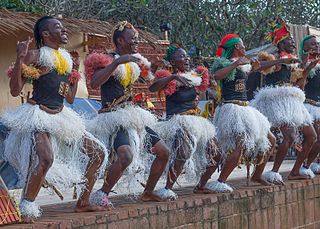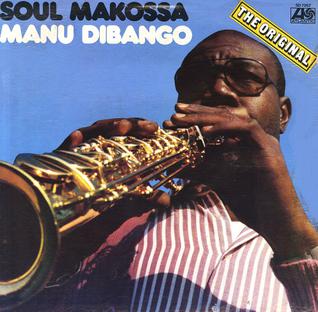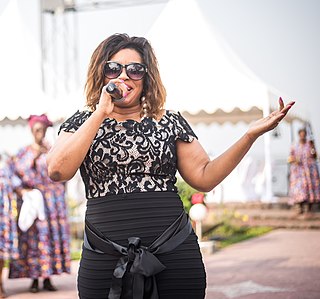
Cameroon, officially the Republic of Cameroon, is a country in Central Africa. It shares boundaries with Nigeria to the west and north, Chad to the northeast, the Central African Republic to the east, and Equatorial Guinea, Gabon and the Republic of the Congo to the south. Its coastline lies on the Bight of Biafra, part of the Gulf of Guinea and the Atlantic Ocean. Due to its strategic position at the crossroads between West Africa and Central Africa, it has been categorized as being in both camps. Its nearly 27 million people speak 250 native languages, in addition to the national tongues of English and French, or both.
Makossa is a music genre originating in Douala, Littoral Region, French Cameroons in the late 19th century. Like much other music of Sub-Saharan Africa, it uses strong electric bass rhythms and prominent brass. Makossa uses guitar accompaniments, in the forms of solo and rhythm guitar, with a main singer and a choir of backup singers, with the focus being on the texture of the guitar, the role it plays in the song, the relationship between it and other instruments, the lyrical content and languages sung as well as their relationship with the music, the uses of various percussion instruments, including the bottle, the groove of the bass as well as the drums, and the use of technical knowledge and microprocessors to make the music. It is in common time (4/4) for the vast majority of cases. Language-wise, it is typically sung in French, Duala or Pidgin English. Tempo-wise, it is typically in between 130 and 170 BPM. It traditionally consisted of guitar-picking techniques that borrows from bikutsi; with a guitar-structure of a guitar switching from solo to rhythm from assiko; supplanted with complex bass grooves, and gradually picked up on brass section, from funk and later in the 70s, string section, from disco. It along with this acquired the sebene from Congolese rumba. In the 1980s makossa had a wave of mainstream success across Africa and to a lesser extent abroad. It is considered to be one of the greatest Cameroonian and even African "adventures" as a music.

The music of the Cameroon includes diverse traditional and modern musical genres. The best-known contemporary genre is makossa, a popular style that has gained fans across Africa, and its related dance craze bikutsi.

Emmanuel N'Djoké "Manu" Dibango was a Cameroonian musician and songwriter who played saxophone and vibraphone. He developed a musical style fusing jazz, funk, and traditional Cameroonian music. His father was a member of the Yabassi ethnic group, while his mother was a Duala. He was best known for his 1972 single "Soul Makossa". The song has been referred to as the most sampled African song in addition Dibango, himself, as the most sampled African musician in history. He died from COVID-19 on 24 March 2020.

The Cameroon People's Democratic Movement is the ruling political party in Cameroon. Previously known as the Cameroonian National Union, which had dominated Cameroon politics since independence in the 1960s, it was renamed in 1985. The national president of the CPDM is Paul Biya, the president of Cameroon, while the secretary-general of the party Central Committee is Jean Nkuete.

Bikutsi is a musical genre from Cameroon. It developed from the traditional styles of the Beti, or Ewondo, people, who live around the city of Yaoundé. It was popular in the middle of the 20th century in West Africa. It is primarily dance music.

"Soul Makossa" is a song by Cameroonian saxophonist and songwriter Manu Dibango, released as a single in 1972. It is the most sampled African song in history. The song was originally recorded as the B-side for "Hymne de la 8e Coupe d'Afrique des Nations", a song celebrating the Cameroon national football team's accession to the quarterfinals of the Africa Cup of Nations football tournament, as well as Cameroon's hosting the games for the first time; the lyrics were written by Cameroonian poet and musicologist S.M. Eno Belinga. Except for some words in English, it was written in Duala, a native dialect continuum from Cameroon. Manu Dibango later recorded a new version for his 1994 album Wakafrika, titled "Mouvement Ewondo".
Sam Fan Thomas is a Cameroonian musician associated with Makossa. He began in the late 1960s and had his first hit with "Rikiatou". His "African Typic Collection" was an international hit in 1984 and is perhaps his best known work. Thomas began his career in the early 1970s as a guitarist in the Cameroonian band Tigres Noires. He stayed with that band until 1976, when he launched his solo career.
Prince Eyango is a Cameroonian singer, guitar player, songwriter, performer, and record producer. Popularly known as KING MOUAN NKUM, Le Roi Des Montages is the 3rd child of Eyango family. He made his professional debut in 1983. By 1986 Ndedi Eyango developed a musical style merging both pop and traditional Cameroonian Makossa music. The son of a pastor, Ndedi Eyango sings in French, Pidgin English, Douala, and Mbo'o languages. His biggest hit, "You Must Calculer" won best song of the year in 1987, best selling album of the year and Eyango won the Cameroonian "Best Artist of the Year Award".
Moni Bilé is a Cameroonian makossa musician. He was the best-selling makossa performer of the 1980s, and his album Amour & Espérance was an international hit that extended the worldwide popularity of the genre.
Francis Bebey was a Cameroonian musicologist, writer, composer, and broadcaster.

Sports in Cameroon is practiced widely by the population and advocated by the national government. Cameroonians take pride in victories at international competitions, making sport an important source of national unity. Traditional sports in Cameroon include canoe racing, swimming, tug of war, and wrestling. Wrestling has featured in the initiation rites and other ceremonies of ethnic groups such as the Bakweri and the Duala. However, in modern times, sports such as basketball, boxing, cycling, handball, netball, caber toss, and table tennis have become popular. The 40 km Mount Cameroon Race of Hope draws several hundred runners each year. Tourists hike, rock climb, and mountaineer, especially up Mount Cameroon. Yaoundé, Tiko and Kribi have golf courses. Rugby union is also played, with about 15 clubs and 3,000 players nationally.

Dance in Cameroon is an integral part of the tradition, religion, and socialising of the country's people. Cameroon has more than 200 traditional dances, each associated with a different event or situation. Colonial authorities and Christian missionaries discouraged native dances as threats to security and pagan holdovers. However, after Cameroon's independence, the government recognised traditional dance as part of the nation's culture and made moves to preserve it.
Ebenezer Diboué Black is a singer, composer and musical producer from Cameroon. He is also a songwriter, and performs his songs in French and Duala. His repertoire is mainly makossa and zouk. He is considered the pioneer of the "Makossa-Consciousness" style, which name has probably been derived from the title of his latest album entitled Positive Consciousness.
Jacob Nguni, nicknamed "Pa Jay" or "Micro-wave", was a Cameroonian singer, high-life guitarist, activist, humorist whose partnership with late Prince Nico Mbarga as a lead guitarist produced songs like Sweet Mother that redefined the era of High-life music in Africa. The song would go on to become the Africa's best selling song with 13 million copies. The song was equally voted in 2004 in a BBC poll as Africa's favourite song. He died in his sleep in the late hours of Saturday 25 April 2015 in Washington D.C.

H.I.V is the debut album of the Cameroonian rapper and producer Jovi, released August 31, 2012. Entirely self-produced under his producer alias, "Le Monstre", Jovi composed, recorded, and mixed the album in Yaoundé, Cameroon. The album blends instrumentation and rhythms from traditional Cameroonian genres with Western hip hop beats and style, as well as influences from pop, rock, electronic and industrial genres, and includes samples from African musicians Tabu Ley Rochereau and Eko Roosevelt. H.I.V received critical acclaim for its use of punchlines, rhyming, and wordplay in Pidgin English, mixed with English and French. Jovi’s H.I.V album was highly anticipated in Cameroon following the release of his debut video “Don 4 Kwat” on October 14, 2011, which is seen as re-energizing the hip hop scene in Cameroon, which had largely been dormant and dominated by Bikutsi and Makossa genres. Originally released on iTunes for sale, the album was removed after one year, and became available for free download on Bandcamp on September 12, 2013, according to the website, as a "special edition of Jovi's debut album."
Nde Ndifonka, popularly known by his stage name Wax Dey, is a Cameroonian singer, songwriter, entrepreneur and social activist. He won Best Male Artist in Central Africa at the 2016 All Africa Music Awards (AFRIMA). He owns a record label called Calabash Music. In December 2015, he released the Yemi Alade-assisted "Saka Makossa" and pays tribute to the Makossa music genre. Wax Dey is also the Producer and main actor of Cameroonian reality TV contest, Number One Girl, which airs on Equinox TV.
Charlotte Mbango Samè was a Cameroonian Makossa singer.

Grace Decca is a Cameroonian singer and producer from Douala, the country's economic capital. She is the younger sister of Ben Decca, a well-known Makossa singer, and she worked alongside him and other musicians like Jean Jacques Goldman before establishing her own career in 1989 with the album Besoin d'amour.. Her five other Makossa albums are Le Duo D.K (1992), Doï La Mulema (1993), Appelle-moi Princesse (1998), and Donne-moi un peu d'amour (2001). She returned to the Cameroonian music scene in 2014 with a gospel album, Mouna. She has also started her own label, GNS Productions.

Salatiel Livenja Bessong, better known as Salatiel or "High man general", is a Cameroonian Music executive, the CEO of Alpha Better records located in Buea, Cameroon. In 2019, he featured on Beyoncé’s The Lion King: The Gift Album on the track "Water".









